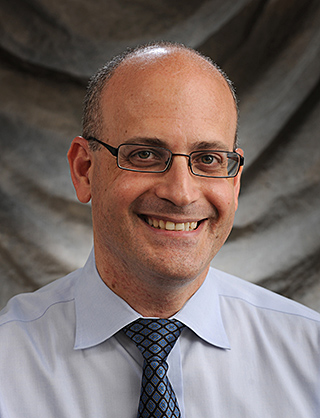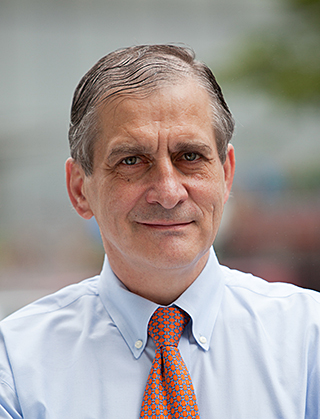CAR T-Cell Therapy, a Breakthrough Treatment for Cancer Patients
Why this therapy holds promise for patients with certain types of lymphoma and leukemia after other treatments have failed.
Most doctors tend to be cautious about throwing around phrases and words like game changing and groundbreaking — particularly when it comes to cancer treatments. But CAR T-cell therapy, a type of immunotherapy, is offering hope where there was none before.
Last year, NewYork-Presbyterian/Weill Cornell Medical Center and NewYork-Presbyterian/Columbia University Irving Medical Center began providing the novel therapy that genetically alters a patient’s own immune cells to fight cancer.
The approved CAR T-cell therapies are for adults with advanced large B-cell lymphoma and for children and young adults with the most common childhood cancer, acute lymphoblastic leukemia, known as ALL. For both blood cancers, the treatment is intended for patients who have not responded to standard treatments — chemotherapy and/or bone marrow transplantation — or whose cancer has returned after receiving the standard therapies. At that point, prospects for survival can be dire.
Though approved by the U.S. Food and Drug Administration for two types of cancer, CAR T-cell treatments for other cancers and life-threatening diseases are just a matter of time, experts say.
“Like the invention of radiation therapy, or the bone marrow transplant, or the first chemotherapy drugs, this could be the beginning of something quite spectacular,” says Dr. Koen van Besien, director of the Stem Cell Transplant Program at Weill Cornell Medicine and an attending physician at NewYork-Presbyterian/Weill Cornell Medical Center.
“Clinical trials that are already active at our centers examine the utility of CAR T cells in other types of lymphoma, myeloma, and certain solid tumors such as pancreatic cancer, prostate cancer, and sarcoma,” adds Dr. Ran Reshef, director of translational research in the Blood and Marrow Transplantation Program and clinical lead for the CAR T-Cell Program at NewYork-Presbyterian/Columbia.
Here, Drs. van Besien and Reshef answer questions about CAR T-cell therapy, and discuss what this major stride means for the future of cancer treatment.
What is CAR T-cell therapy?
Dr. Reshef: It’s a type of immunotherapy, one that holds great promise in treating cancer. The major challenge with immunotherapy has been to find a way to improve the immune system so that it can do a better job of fighting cancer.

Dr. Ran Reshef
That’s what CAR T-cell therapy involves — collecting lymphocytes, also called T cells, from cancer patients, then sending the T cells to a lab to be genetically modified. I like to think of it as arming them to be able to recognize tumor cells. Once these newly armed T cells are manufactured, which takes two to four weeks, we infuse them back into the same patient so these cells can start attacking cancer cells.
Dr. van Besien: The CAR in CAR T-cell therapy stands for chimeric antigen receptor. With CAR T-cell therapy a patient’s T cells are implanted with a new receptor that makes the T cell super potent and able to recognize tumor cells. It’s a one-time treatment and, if all goes well, the T cells will expand and start attacking the lymphoma or leukemia, and the patient will achieve a complete remission. These T cells live and proliferate in the patient and continue to fight cancer. It’s a fantastic invention.

Dr. Koen van Besien
Why is CAR T-cell therapy considered to be such a huge advance?
Dr. van Besien: Simply put, it has the ability to eradicate large B-cell lymphoma and childhood acute lymphoblastic leukemia in patients where nothing else has worked. CAR T cells use a totally new mechanism of action. It’s a living drug, where the new T cells not only attack the cancer but also continue to multiply and persist in the patient.
Dr. Reshef: There is no question that using a patient’s own immune system to fight cancer is one of the major medical breakthroughs of the 21st century. What’s truly surprising is the tremendous potency of these re-engineered T cells. With a single infusion, these T cells destroy pounds and pounds of tumor. Someone coined the term serial killers to describe them, and I think that’s appropriate. These modified T cells move on to kill one tumor cell, then the next, and the next, to the very last one. As a result, patients who were once considered incurable are now going into complete remission for two years or longer. Some patients treated in the earliest clinical trials have now been in remission for more than eight years. It’s unprecedented.
What’s the process like for patients?
Dr. van Besien: Over two to three hours, an apheresis machine collects a patient’s blood, skims off the lymphocytes (or T cells), then returns the blood to the patient. The T cells then are shipped to the pharmaceutical company’s manufacturing facility to be genetically modified and proliferated. Two to three weeks later, the new T cells are sent back for infusion into the patient. Shortly before the infusion, patients receive a mild form of preparatory chemotherapy meant to reduce their own lymphocytes and make room for the new “super potent” T cells to establish themselves.
“There is no question that using a patient’s own immune system to fight cancer is one of the major medical breakthroughs of the 21st century. ”— Dr. Ran Reshef
What are some of the challenges?
Dr. Reshef: If all goes well, the patient recovers in the hospital or home after a single infusion of CAR T cells. The T cells will proliferate and start attacking the cancer cells. But roughly one-third of patients experience serious side effects that require acute management in the hospital, occasionally in intensive care. This occurs when the new T cells cause an aggressive inflammatory response in the patient. One side effect can be cytokine release syndrome (CRS), which causes shortness of breath, malaise, high fever, and a drop in blood pressure and oxygenation, among other symptoms.
Dr. van Besien: In addition to CRS, the inflammatory response can cause neurotoxicity, resulting in difficulty speaking, drowsiness, disorientation, and even coma. Not all patients experience this, but most will experience some of these side effects within the first two to four weeks of treatment. That’s why CAR T-cell therapy is reserved for the patients who have no other options and why it’s administered only in specialized centers, and only when the first-line treatments have failed. The good news is that the overwhelming majority of patients completely recover from these side effects.
Does CAR T-cell therapy work for everyone who receives it?
Dr. Reshef: In leukemia in children, it seems that between 60% and 70% will have a durable long-term response. In lymphoma cases, it seems that close to 40% of patients have a durable response for at least two years.
Dr. van Besien: We don’t know yet how many patients are going to be cured with CAR T cells. Patients who were involved in CAR T-cell studies were patients who had no chance with anything else. The studies show that almost half of the patients treated do very well. It seems quite powerful.
“Like the invention of radiation therapy, or the bone marrow transplant, or the first chemotherapy drugs, this could be the beginning of something quite spectacular.”— Dr. Koen van Besien
Where do you see CAR T-cell therapy going next?
Dr. Reshef: This is just the tip of the iceberg. We’re at a moment almost akin to the first chemotherapy treatments. We started with one type of chemo and now, five decades later, we have dozens of different chemotherapy agents. In the same way, there’s the potential for CAR T-cell therapy to expand and to be used for other cancers, as well as autoimmune diseases and inflammatory conditions. In the next three to five years, I think we’ll see the results of ongoing studies where CAR T-cell therapy is used to treat multiple types of blood cancers — and even solid tumors. At Columbia we have trials with CAR T cells and similar cell therapies for various types of lymphoma, myeloma, and certain solid tumors, including highly incurable cancers such as pancreatic cancer and sarcoma. I am very optimistic and hopeful that we will see treatment success in these trials.
Dr. van Besien: There is a trial here at Weill Cornell looking at CAR T-cell therapy for myeloid leukemia, where we use cells from a universal donor, off the shelf, so the therapy can be administered immediately, without the two-to-three week wait. I think we’ll continue to see variations like these. Another Weill Cornell trial that we are hoping to start soon is looking at CAR T cells to treat aggressive thyroid cancer. I’m usually a skeptic, but the therapy could be truly transformative. It’s quite a difficult treatment, but it’s just a matter of time before our science friends come up with tweaks that reduce the complications, expand its uses, and make it even more effective.
Ran Reshef, M.D., is director of translational research in the Blood and Marrow Transplantation Program and clinical lead for the CAR T-Cell Program at NewYork-Presbyterian/Columbia University Irving Medical Center. He is an associate professor of medicine at Columbia University Vagelos College of Physicians and Surgeons.
Koen van Besien, M.D., Ph.D., is director of the Stem Cell Transplant Program and a professor of medicine at Weill Cornell Medicine, and an attending physician at NewYork-Presbyterian/Weill Cornell Medical Center. He specializes in the management of patients with recurrent lymphoma using stem cell transplant and cellular therapies.
Additional Resources
Learn more about CAR T-cell therapy at NewYork-Presbyterian.

